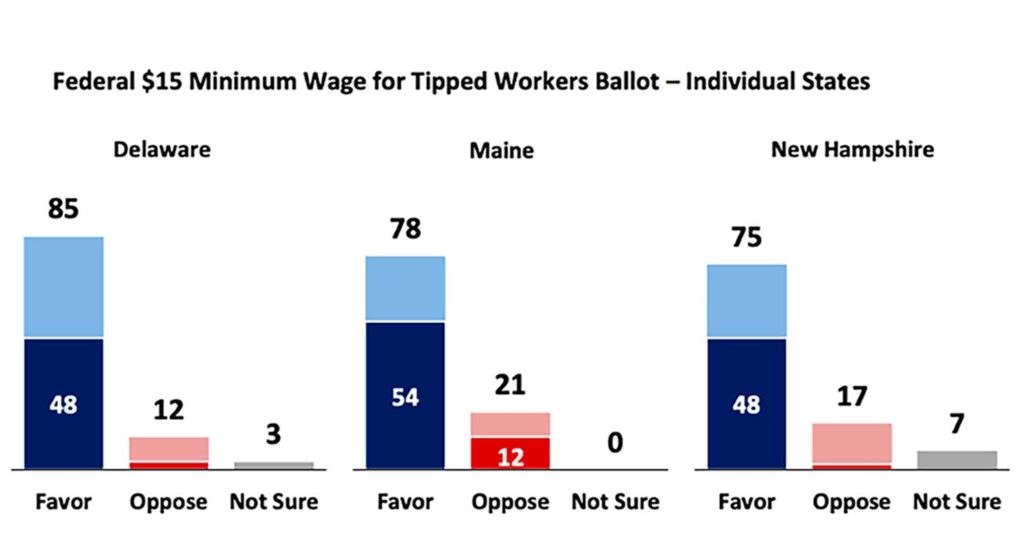By Colin Monahan

Residents of Portland prepare to head to the polls this November 8th to contend with a series of citizen initiative ballot questions pertaining to the city’s regulation of short-term rentals, tenant’s rights, cruise ships, and minimum wage.
Ballot Measure D, titled “An Act to Eliminate the Sub-Minimum Wage, Increase Minimum Wages and Strengthen Protections for Workers,” seeks to incrementally increase the minimum wage for all workers to $18.00 per hour by 2025. The proposal specifically includes government employees, contracted workers currently not receiving the minimum wage (such as Uber drivers and InstaCart personal shoppers) and tipped restaurant workers. Currently, the minimum wage for Maine servers, bartenders, and other tipped workers is $6.38 per hour. The state minimum wage is $12 per hour for all other non-exempt workers.
The Maine Democratic Socialists of America (DSA) proposed four of the five citizen initiatives as part of their Livable Portland project. Wes Pelletier, a committee member of the DSA project said, “What we want is for people who work in Portland to be able to live here, to be able to contribute and not have to move out of the city.”
Fighting over the Tip Credit
Opposition groups, Restaurant Workers of America and Restaurant Industry United, claim that rising labor costs will be the “nail in the coffin for the Portland dining scene.”
“It’ll force a lot of us, senior staff and career servers to work outside of the City of Portland and really kill and obliterate the dining scene here in Portland,” said Joshua Chaisson, President of Restaurant Workers of America. “This would mean a 175% increase [in labor costs] for 80% of a full-service restaurant staff over the course of three years. I don’t think any industry could sustain that.”
“There’s no data to support that. There are seven other states that have gotten rid of the tip credit,” said Pelletier of DSA. In fact, Alaska, California, Minnesota, Montana, Nevada, Oregon, and Washington have all eliminated the tip credit.
According to the Federal Register, a “tip credit” is a method for employers to pay their employees who receive tips at sub-minimum wage – such as $6.38 per hour in Maine – if the employees’ tips are sufficient to fulfill the remainder of the minimum wage.
Legacy of Sexism and Racism
Maine DSA has said that the tip credit has a legacy tied to sexism and Jim Crow laws. “Many marginalized people, black and brown people, just make less on tips because people are racist, and they tip less. And they are in work situations that are more predatory. The Maine Center for Economic Policy [MECEP] estimated that women will be paid more, black workers will be paid more, across the board marginalized communities will get a raise out of this,” said Pelletier.
MECEP has reported in a recent analysis of the ballot measure that women are much more likely to be paid under the tip credit system. Approximately seventy percent of Portland’s tipped workers are women.
The report also found that “the increased minimum wage will help to close existing pay disparities, as women and workers of color are more likely than men and white workers to be paid wages below $18 per hour. Forty-two percent of women working in Portland will see a wage increase, compared to thirty percent of men. [Additionally], the new minimum wage would particularly help workers who are either younger (under 25) or older (65 and older).”
One Restaurant’s Support for Raising Minimum Wage
Ruby’s West End, a family eatery on Pine Street and WEN advertiser, pay their employees the full minimum wage. “This ballot measure does not mean everybody will lose their jobs. In fact, I think that just the opposite would happen. You will have stronger cultures, you will have better customer service, you will have more buy-in from your employees. The comradery that will happen between the front of the house and back of the house team will blow your mind,” commented Ruby’s co-owner Corrinna Stum.
Ruby’s West End is a member of the One Fair Wage coalition, a nation-wide campaign to end the sub-minimum wage. “Nobody should have ever made $2.13 an hour. If you think about a sub minimum wage, you’re looking at a sub-minimum person. I want people to know that this bill directly affects their community. If service industry workers in Portland are not making a living wage, they’re gonna move and they’re gonna find places that they can afford to live in – because Portland’s getting more expensive. And if we don’t have any workers, you’re gonna see a lot more restaurants closing,” said Stum.
Workers Speak on Minimum Wage and Tip Credit

“I live right behind Ruby’s on Clark Street. It’s difficult to make a month’s rent here on the peninsula,” said David, a West End local and server at Ruby’s. “I came in as a dishwasher and worked my way through the experience with customers. I’m very proud to work here because it’s a family run business. And it’s a business that’s run on fair ethics of pay and equal cut. The amount of money is equal to my other servers and back of house.”
Ruby’s employees have stated that they are not worried that an increase in menu item prices will discourage customer demand. “We’re still gonna have people from all over the country ready to spend their money right in Portland. This is their vacation. This is their off time. They come here and they’re gonna spend money. They’re gonna get the experience that they want. No matter what the price is,” said David.
Minimum Wage and Public Support
Saru Jayaraman, President of One Fair Wage, told West End News that “this is the year of redemption.”
“We just won One Fair Wage in Michigan and we’re on the ballot this November in D.C. And the city council has already declared it will pass… Wherever we go in every state, red and blue, whenever we put this directly on the ballot, it always passes because people overwhelmingly say yes, of course everybody should be paid a full wage.”
Note this study conducted by Lake Research Partners in the Spring of 2021. It found that four out of five workers in Maine support a federal minimum wage of $15 per hour for tipped workers.

“The most important thing that measure D does is that it raises the minimum wage for all workers. It levels the playing field to make it fair for everybody across the board.”
Tip Credit & Restaurant Workers of Maine
One Fair Wage is not new to Maine. In 2016, Maine People’s Alliance and the AFL-CIO worked with One Fair Wage to successfully pass a statewide ballot question to increase the minimum wage to $12 per hour. It also eliminated the sub-minimum wage. However, the elimination of the sub-minimum wage was short-lived. In June of 2017, Governor LePage restored the tip credit. This was after a successful petition by Restaurant Workers of Maine, the predecessor of Restaurant Industry United.
“In Maine, where we won this on the ballot in 2016, in DC, in Michigan, the National Restaurant Association, through astroturf entities they set up, would always get legislators to overturn the will of the people,” said Jayaraman.
Doing More, for Less

As the Portland restaurant scene ascends from the pandemic, workers have begun to reassess their needs. “With Covid happening, everywhere around here is understaffed. So, you’re working extra hours and you’re throwing in extra time, and you’re not being paid extra,” commented Aly, a server at Ruby’s.
“Workers are being asked to do so much more for so much less. 1.2 million workers have left the industry and our survey shows that of those who remain 54% say they’re leaving. And 80% have said the issue that would make them come back is a full livable wage with tips on top… Wages are always the number one reason, 40 to 50 percentage points higher than anything else, because people have just reached a point where they literally cannot afford to work in this industry anymore,” said Jayaraman.
“We really rely on that tourist culture,” said Aly of Ruby’s West End. “But if we increase the minimum wage slightly, then we would have a more consistent year-round supportive industry. It contributes to the local community as well. If we’re making more money, we can go out more and contribute to other businesses. That’s just how it naturally works. When the stimulus package comes, people spend more.”
VOTE
In person voting is Tuesday November 8th. Complete mail-in absentee ballot registration by Tuesday, October 18th. Request absentee ballots by Thursday, November 3rd. Mail completed ballots by November 8th. You can find more voting information at www.Maine.Gov.
Colin Monahan is a community organizer, server, and journalist. His previous work has focused on social movements in Chile, Cuba, Mexico, Vermont, New Hampshire, and Georgia. Colin believes in accessible, independent, local journalism.





